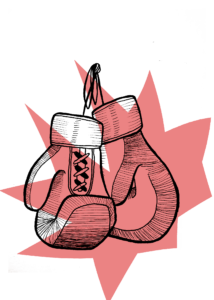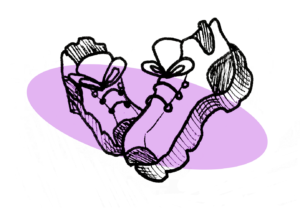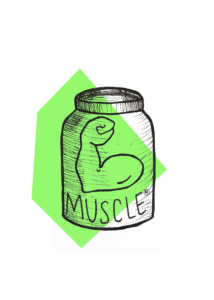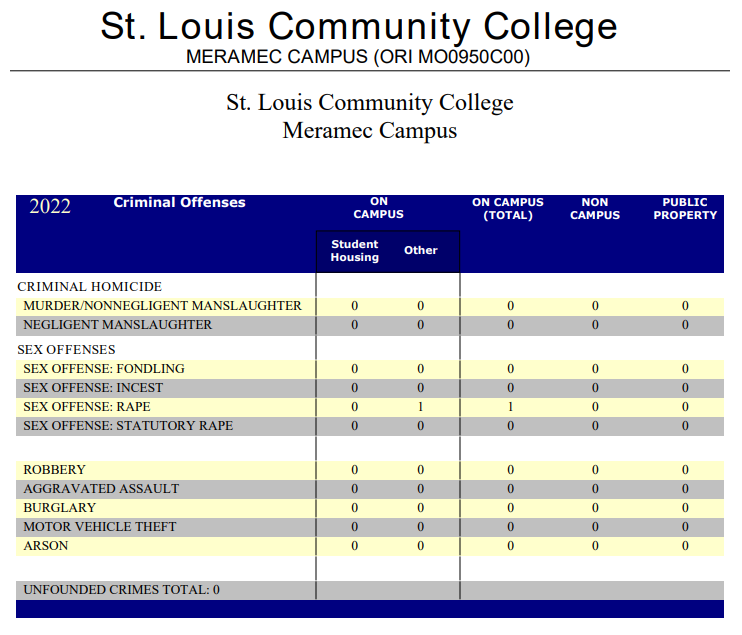Bounce Back From Holiday Break Bingers

BY: TYRA LEESMAN
Print Editor-In-Chief
Here Come The Holidays!
As the semester comes to a close, students begin cramming for finals, often paying less attention to personal health and wellness. Workouts fall to the wayside and the only cramming that occurs involves Thanksgiving dinner. A few weeks after Thanksgiving, the average American college student will travel back home for more family meals, gifts, lazy mornings and excess alcohol consumption.
“Thanksgiving comes right before Hanukkah, Christmas, Yule – all those holiday seasons. So you have at least two traditionally indulgent family meals, and more sometimes, in a matter of weeks. Then there’s New Year’s Eve! All that drinking and partying. Thankfully, New Year’s comes the next day, with resolutions and fitness deals coming out – it’s a great chance to start over,” said Keith Stein, a personal trainer at Torch Fitness in Saint Louis.
A few of the troubles students face over the holiday season include poor diet, lack of exercise, and stress.
Lotsa Matzah – The Diet Portion
Whether it is Hanukkah mandelbrot, Yule caraway cakes or Christmas cookies, carbohydrates and added sugar appear in celebratory feasts across the span of the religious observances and family gatherings of the season.
“It’s because when these religions were founded, people were hungry and cold. For Pagans, Yule is a celebration of being halfway through the dark, cold season. So there’s a Yule log to burn and of course, cakes.
Lots of bread and sweets dishes and potatoes. Carbs keep you padded with fat and warm when it might be a long while before you eat meat again,” said Crystal Daugherty, a Saint Louis Pagan and Meramec student.
Students who overindulge in sugary, processed foods can expect a plethora of unfavorable symptoms, according to Cynthia Hartwig, Nursing Program Coordinator and nursing professor at STLCC Meramec.
“Sugar in moderation is okay. We need to allow ourselves those special treats, but the key is moderation; to make sure we’re getting enough good, healthy foods. Carbs are necessary. We need to have carbs, protein and fat. But we need to have the appropriate ratios for our bodies,” said Hartwig.
According to Stein, symptoms of overeating and indulging in the wrong kinds of food for even a single meal include fatigue, indigestion, brain fog, cravings for more unhealthy foods, heartburn and mental health issues such as depression.
“Too much of the wrong kinds of food, excessive carbs, they tend to make our bodies more sluggish. Processed foods should be avoided. Stick to natural foods. Shop in the peripheral of the stores. Fresh turkey, lots of water, fresh produce,” said Hartwig.
Students who already maintain poor diets are not immune to the effects of a binge meal. In fact, according to Stein, they are much more likely to overindulge than those already watching calories and macros.
“If you’re not already paying attention to what you eat and how much, you’re way more likely to eat the whole pumpkin pie than just a slice. You’ll have four rolls before you realize you’ve even reached for them. The brain really likes carbs. But your body doesn’t need that many, so the extra goes to your backside or belly,” said Stein.
To prepare for the coming season and its colorful, attractive ads and packaging gimmicks, students can take a realistic look at what they are already consuming in a day. Factors to consider include the quality of nutrition for any one particular food, quantity and portion control and the time of day one consumes a meal.
As holiday parties and family gatherings increase, a food-conscious student will be equipped to make healthy choices when faced with sugary and savory favorites.
“Just be aware before going to parties. Have some healthy snacks ready. Drink lots of water. It’s okay to say ‘No,”. You don’t have to do and go to everything. You don’t have to say yes to every party. You don’t have to eat everything on your plate,” said Hartwig.
Sitting Pretty (Pretty Much All the Time)
Students log hours and hours every week seated at desks, and those who work sedentary jobs during the week add even more hours to their seat-time.
During the holidays, cold weather keeps local students indoors, often remaining inactive for the entirety of the cold months.
“[Being sedentary] is not good for any of us. Every hour, get up and move. If you sit for 50 minutes, get up and move for that last ten minutes. A sedentary lifestyle is as bad for your body as smoking,” said Hartwig.
Students who play sports or work out regularly may find the holiday to be an ample excuse to take a break from physical effort, but nothing could be more harmful to existing performance, according to Stein.
“What happens to your muscles after even a week away from training can just be devastating! Personally, I run in the morning if I know I’m going to be having a big meal like on Thanksgiving.
It helps me make better choices on portions, but it also means I’m not sitting around at a table all day or in a chair drinking bourbon, doing nothing,” said Stein.
According to Stein, taking time off of training isn’t always a bad thing, but active students should try replacing the physical activity with something milder and easier, but still effective. Walking and yoga are his favorites.
“After Thanksgiving dinner, my sister and I go Black Friday shopping. Not because we really care about buying things, but because we walk and walk and walk all day without sitting down. It’s easy to stay active if you just enjoy what you’re doing,” said Daugherty.
Stein suggests that students who are not already active, or students who desire to make a permanent change in their overall health by adding in exercise, should look for sports and activities they enjoy.
“If you love hiking, try walking a track. If you watch a lot of soccer or hockey, believe it or not, try a martial art. There’s something really satisfying about kicking and punching. If you hate exercise, just look for something that will keep you interested and excited. Dance or swim or study yoga. It’s all about stick-ability – what you’ll stick to,” said Stein.
Meramec hosts a wide range of PE classes in the Physical Education building, including Weight Lifting, Fitness Center, Yoga and Tai Chi.
Students? Stressed? No. Way.
According to Hartwig, students are one of the most anxious, stressed-out demographics in the country. Deadlines, papers, projects, classes and jobs can pile on the responsibilities of a college student.
The additional tension of being near family, the dearly beloved and the reasonably tolerated, makes the holiday season a high-stress time for most people, according to Stein.
“We all have that great Uncle who voted for Voldemort and thinks racism is acceptable if it’s politely-put. If Mom sits you next to that guy for a three-hour Thanksgiving meal, your stress is going to go way high. Worse if you’re still at the kid table. I shudder to think. You’ve got exams on your mind, kids in your face, and beliefs to stand up for at your elbow. It’s not your mommy bringing you pie and letting you sleep in,” said Stein.
Students who are already feeling inundated may find the holidays to be a relaxing break, but the weeks following can be disastrous while they are playing catch-up. For others, the break itself can cause overload. According to Hartwig, stress comes with more unpleasant symptoms than simply feeling overwhelmed or behind schedule.
“You might have a lack of mental awareness, hormonal changes, tiredness, gaining weight, fatigue, and sometimes even depression. Cortisol is a sugar hormone and can cause you to gain weight. But a lot of times people don’t even think about the fact that being stressed just makes existing stress worsen. Depression can get worse if you already have it, or you might find that you are experiencing depression during stressful times that you hadn’t had before,” said Hartwig.
Students who find that their coursework is overwhelming, or who do not have the best families back at home can find counseling at Meramec by licensed counselors. According to Stein, some good methods for stress management include mindfulness meditation, taking enough time to sleep, hydrating properly, exercising and stretching.
“If you’re having a bad day, take a hot bath or take ten minutes to meditate. I really love to just go for a jog. Even if it’s cold, I don’t mind because I get some quiet time to myself or I listen to some uplifting music. It’s all about finding something that calms and encourages you, even for just a little while,” said Stein.
According to Hartwig, depression and stress can often be directly linked to chronic dehydration and the body’s inability to function properly while dehydrated. Drinking enough water and getting enough sleep are her best suggestions for fighting stress over the holidays.
Try, Try Again (and Again)
As the holidays come to a close, students may find that they have simply decided to live their lives to the fullest (or for some, coped with the season by indulging) and the Freshman Fifteen may look more like a Junior Jelly Roll.
Hartwig advises letting it all go.
“Just let it go. You can’t fix it. Start fresh and really think about exercising three times a week, if possible. Think about having protein, carbs, and fat at every meal. We all make choices and mistakes, and we just let it go,” said Hartwig.
According to Daugherty, getting back on track is as simple as stopping bad habits in their tracks and going back to what one knows is healthy.
“If you’re not sleeping enough, stop staying up late playing W.O.W. If you’re overeating, throw away the cereal and mini donuts and go buy some grown up food. If you’re getting a little pudgy, get off the couch. You know what to do. You just need to find the motivation to do it. Want it bad enough!” said Daugherty.
Stein promotes goal-setting and achievable, smaller levels with rewards for making the most lasting progress.
He always has his clients write down a big goal and then several smaller, easy-to-achieve steps along the way. This way, he says, they know what to do next and they’re excited to do it.











